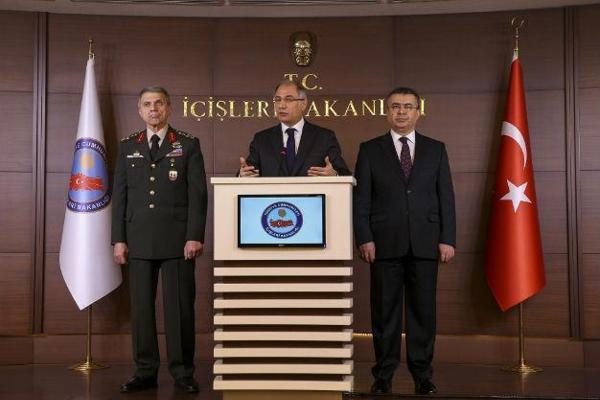Police identifies Istanbul bomber as ISIL member
ANKARA


AA photo
The Turkish interior minister has said the Istanbul bomber, which killed four people and wounded 39 in a suicide attack on central Istanbul’s İstiklal Avenue, had links with the Islamic State of Iraq and the Levant (ISIL), as the country experienced the jihadist group’s second terror attack in the city since January.“The identity of terrorist who carried out this wretched suicide attack has been determined. This person, this terrorist is Mehmet Öztürk, born in 1992 and registered from the Gaziantep province. Current findings show that the terrorist has links to the DAEŞ terror organization,” Interior Minister Efkan Ala has said, using the Arabic acronym for ISIL.
Ala also emphasized that other connections in the attack had been meticulously researched, adding that an all-around investigation into the incident has been ongoing.
The interior minister added that all countries should cooperate and stand against terror attacks carried out all around the world.
Five suspects, including Öztürk’s father Nahsen Öztürk and his brother, were detained after the attack.
Nahsen Öztürk said that his son left home in 2013 for Istanbul and they had connectedly rarely since, daily Hürriyet reported. Police surveilled that Öztürk had joined ISIL and he was being sought for his ISIL membership.
Öztürk reportedly went to Syria the same year he disappeared from home and stayed there until 2015, before illegally re-entering Turkey from the Elbeyi district of the southeastern province of Kilis and later set out for Gaziantep.
It has also been reported that Öztürk stayed at a hotel in the Beşiktaş district of Istanbul on March 18 and received assistance from a person who was from Adıyaman province. Police have begun to seek the person who helped Öztürk.
The identity of Öztürk was confirmed following DNA tests. Police and intelligence units had also focused its search on another ISIL suspect along with Öztürk, named Savaş Yıldız who was among four ISIL members currently being sought in Turkey.
Five people were killed and 39 others were injured in a suicide bomb attack on March 19 in central Istanbul, on the busy İstiklal Avenue in Taksim.
All victims of the attack except the attacker were foreign nationals, three of which were Israeli and the other an Iranian citizen.
Turkish Health Ministry said in a statement on March 20 that a total of 12 people were receiving treatment at various hospitals in Istanbul, with four currently in intensive care units.
Istikal Avenue is Istanbul’s one of the top social spots for locals as well as tourists, as it hosts a number of shopping malls, clubs, bars, restaurants and consular buildings including the Greek Consulate, which was very close to the scene of attack.
A number of locals and tourists have visited the scene of the attack since March 19 and laid carnations for those who were killed in the attack. Placards and notes reading “We are not afraid” in Turkish, English and Hebrew were placed on the scene along with Turkish flags.
Security forces also stepped up their security controls on the major thoroughfare in general with continuous ID checks. However, many shops on Istiklal continued to remain closed the day after the attack as the neighborhood was abnormally empty.
Turkey has been experiencing a steady stream of terror attacks since July 2014, with the latest Istanbul attack marking the country’s fourth attack since January. It came less than a week after a suicide car bomb attack in the heart of the capital city of Ankara, which killed 37 people. The Kurdistan Freedom Hawks (TAK), a terror group linked to the outlawed Kurdistan Worker’s Party (PKK), claimed responsibility for the attack.
The group described the car bombing, which occurred on March 13, as “vengeful action” for security operations against PKK militants and locals in town centers in the southeast that have been underway since July. TAK previously claimed responsibility for a separate car bombing in Ankara last month that killed 29 people. In January, a suicide bomber killed around 10 people, most of them German tourists, in Istanbul’s historic heart, an attack the government blamed on ISIL.
